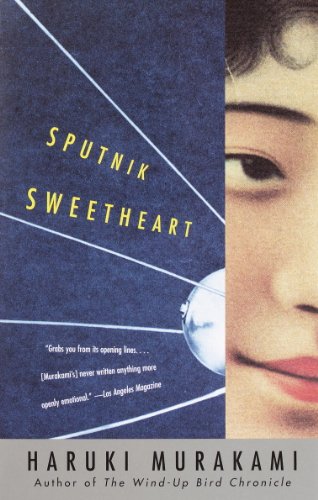
![]() Sputnik Sweetheart by Haruki Murakami
Sputnik Sweetheart by Haruki Murakami
In our Edge of the Universe column, we review mainstream authors that incorporate elements of speculative fiction into their “literary” work. However you want to label them, we hope you’ll enjoy discussing these books with us.
Haruki Murakami’s Sputnik Sweetheart is narrated by an elementary school teacher we know as “K.” K is in love with Sumire, an aspiring young writer who never feels sexual attraction for others until she meets Miu, an older woman and a wine dealer who is incapable of feeling love for others.
It’s the world’s most depressing love triangle, after Twilight.
In many ways, actually, Sputnik Sweetheart feels like a typical Haruki Murakami novel. The narrator finds his relationships with others — not just the love triangles — difficult to maintain and unsatisfying. Like other Murakami novels, Sputnik Sweetheart explores feelings of detachment and confusion about how to behave around others without sacrificing one’s integrity. Best of all, there’s also a creepy mirror world that recalls Hard-Boiled Wonderland and the End of the World, Kafka on the Shore, and After Dark. And although our narrator is not one of Murakami’s funny Raymond Chandler characters, there are some good one-liners.
(My favorite: Sumire tells the narrator that “if they invent a car that runs on stupid jokes, you could go far.”)
To some extent, I struggled with Sputnik Sweetheart compared to many of the other Murakami novels I’ve read. This is a novel that suggests we do not truly connect with others but are rather like cold, lifeless satellites orbiting around each other without ever truly traveling together, not a very pleasant thought.
Naturally, given this theme, Murakami resists the urge to gratify our need to understand others. K. and Sumire feel powerful frustration and longing, but they cannot find ways to bring these feelings to any sort of resolution, and neither are we the readers able to reach a satisfying resolution. While some might find any alienation on the reader’s part brilliantly fitting, I mostly felt alienated from the characters.
I suppose that even in a novel about detachment, longing, and isolation, I still expect to identify with the characters or at least with their aspirations. For example, in Sputnik Sweetheart, I would at least expect to feel attracted to either Sumire or Miu. But I didn’t find Sumire attractive, let alone interesting, and I didn’t find Miu interesting until the climax of the novel. So I didn’t connect with K. and Sumire’s feelings of detachment and frustration.
Having said that, I did find one section of the novel extremely powerful, a scene in which Miu shares an experience of feeling alienated from herself. It may be a spoiler to share, so readers should only read the following paragraph (by highlighting the text) if they are prepared to potentially spoil the novel.
Miu explains that she had an experience that causes her to lose the ability to feel anything for others. She is trapped on a Ferris wheel with a pair of binoculars and is able to look into her apartment. There, she sees a copy of herself having sex with a man. Miu feels that what they are doing is humiliating to her, but her copy clearly enjoys it. It is one of the strangest scenes I can recall reading.
Long time fans and readers new to Haruki Murakami might choose to pick up Sputnik Sweetheart, but, speaking personally, I would recommend Kafka on the Shore, South of the Border, West of the Sun, and After Dark ahead of it.



Great review. I agree that the particular scene you describe is one of the best AND most memorable. I’ve read this novel about three or four times now (once on audible), and that scene is very powerful. I also agree with your assessment of the theme and that it’s depressing; there’s no way around that fact when it comes to this book!
For all my agreement, this book is still a favorite of mine. I’m not sure why. Perhaps it’s because it was the first novel I read by Murakami (and also one of the first book reviews I ever wrote for a newspaper). I’m not sure I can put my finger on it, but I think it’s BECAUSE of the detachment I feel. For some reason, Murakami often appeals to me because of how little I seem to be able to relate to the characters in his books. Murakami is the only author for which I can make this odd claim. You’ve certainly got me thinking more about why my agreement of your assessment makes me rate it much higher. I think my reaction must be a strange one.
I also agree with your suggesting Kafka, South of the Border, and After Dark as better books to start with, even though SS worked for me as a first Murakami novel. I’ve certainly never recommended it to others as a first-time read. I love teaching After Dark in my classes. I’d like to teach some of the other longer books, but they are hard to squeeze into my writing classes because of the nature of the course.
I just finished listening to the audio of the new book and am rereading it on my Kindle now in order to write a review. I enjoyed it quite a bit, but haven’t figured out yet where I place it on the spectrum of Murakami books!
Thanks for reviewing Murakami; I also hope to post reviews of some of Murakami’s older works (including his first two that he won’t allow to be published here — they are available in English, however, because they are used to teach English in Japan, so the books are translated into English with notes for students in Japanese!).
Peace,
Brad